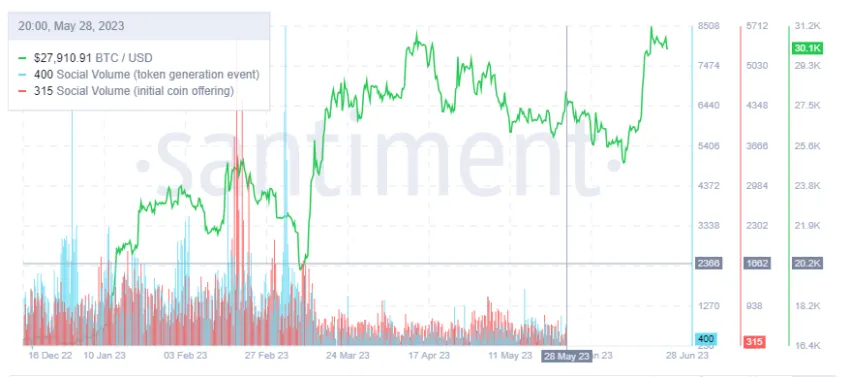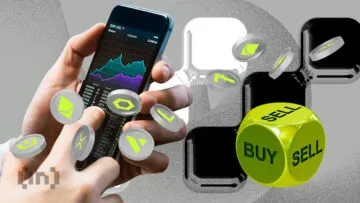With new crypto tokens launching daily, you may have encountered the term ‘Token Generation Event” or TGE token. Some people use the term TGE interchangeably with a token sale or ICO, but do they mean the same thing?
In this guide, we dive into what TGE means and how the industry evolved from using ICOs to TGEs as a popular means of crowdfunding.
What is a Token Generation Event? An overview

A Token Generation Event or TGE is where a new token is made available to a community of buyers for the first time, typically on a project’s website or cryptocurrency exchange. A TGE is hosted to crowdsource funds for a blockchain project. TGEs are critical in publicizing and engaging with the crypto community to raise funds for the project.
Token Generation Event is often falsely used interchangeably with Initial Coin Offering (ICO), but they are not the same. Let’s look at the differences so we can get a better grasp of what a TGE token really is.
Difference between a token and a coin
A cryptocurrency coin is a digital asset that is native to its own blockchain. For example, bitcoin (BTC) is native to the Bitcoin blockchain. Similarly, ether (ETH) is native to the Ethereum blockchain. Thus, both ETH and BTC are coins.
In contrast, a token is a digital asset built on top of an existing blockchain using the standards set out by the blockchain’s smart contracts. For example, ERC-20 tokens on Ethereum. Now let us take a look at the difference between TGEs and ICOs.
TGE vs. ICO: What’s the difference?

ICO stands for Initial Coin Offering. A TGE and an ICO have the same end goal: to raise funds for a particular blockchain-based project and list the token on crypto exchanges for the public to trade. According to the social monitoring platform Santiment, TGEs have been making much buzz of late compared to ICOs.
However, in December 2017, the SEC classified tokens that were distributed using an ICO as securities. At that time, the SEC Chair, Jay Clayton, stated:
“… a token constitutes an investment contract and therefore is a security under our federal securities laws. Specifically, we concluded that a token offering represents an investment of money in a common enterprise with a reasonable expectation of profits to be derived from the entrepreneurial or managerial efforts of others.”
In other words, ICOs are not only subject to high regulatory standards but also could also fall under U.S. securities law. Since then, most projects and startups in the blockchain community have opted to brand their fundraising events as TGEs rather than ICOs.
Crypto projects typically structure TGE tokens so that they are not securities. They are exempt from the strict legal implications that ICOs carry. As such, they are easier and less expensive to carry out than ICOs.
How does a TGE work?

Token Generation Events function similarly to Initial Coin Offerings. During the event’s launch, the project owners generate tokens on a blockchain and offer them to potential investors.
Projects offer TGEs in different ways. For instance, a TGE may start with a private round, known as a presale, where a small amount of the tokens is privately sold to some investors. Usually, this is done to raise funds for the main event and marketing purposes. Investors participating in the presale round often receive special rewards such as highly discounted prices, voting rights, etc.
Once the private sale is successful, the main TGE may follow. At this stage, the tokens are offered to whitelisted community members through a Launchpad website. Once this public sale is over, the next step is to list the token on a centralized or decentralized exchange that all public members can access.
/Related
More ArticlesNote that a strategic listing of a token on a renowned crypto exchange may increase a project’s reputation and exposure significantly. Furthermore, a token’s pairing, liquidity, and ease of trading are important factors of success and adoption for any token.
Utility tokens vs. security tokens
In this section, we will take a closer look at the difference between security and utility tokens.
Security tokens
Security tokens derive their value from an underlying investment asset such as gold, stocks, or real estate. For example, let’s say you want to invest in gold but do not wish to own and store physical gold. Alternatively, you could invest in a token whose value changes depending on the price of actual gold. In this way, you don’t own gold but a representation of it through the token.
Security tokens can also afford investors various rights, such as voting, receiving dividends, or selling the tokens to third parties. Security tokens must be registered with the SEC since they are subject to federal securities laws and regulations.
Utility tokens
Utility tokens grant access to specific products or services within a platform or ecosystem. Unlike security tokens, utility tokens do not represent ownership of an underlying asset or other financial rights or dividends. As a result, utility tokens don’t adhere to the same laws and regulations as security tokens.
You can useuUtility tokens for various purposes, such as accessing decentralized applications (dApps), obtaining discounts, or participating in platform governance through voting mechanisms. Although utility tokens don’t represent ownership, they can have a monetary value. These tokens derive their value from the demand and utility within the associated platform and are typically not subject to securities regulations.
Regulation of security and utility tokens
The difference between utility and security tokens is not always obvious. The usage or marketing of a token may determine its classification. Sometimes, a utility token may be later reclassified as a security token if regulators establish that its primary use case is being traded as an investment rather than for its intended utility purpose.
The SEC applies the Howey Test to establish whether a token is a security. This is a four-part test established by the United States Supreme Court in the case of SEC v. W.J. Howey Co (1946). It determines whether an investment contract exists between the token issuer and buyers. If a token satisfies all four components of the test, then it is likely to be considered a security. These four elements of the Howey Test are:
- Investment of Money: There must be an investment of money or assets in a common enterprise.
- Expectations of Profits: Investors must expect profits from the investment.
- Common Enterprise: The profits must come from the efforts of a third party or a promoter.
- Efforts of Others: Any potential profits must be derived primarily from the efforts of others rather than the investor’s efforts.
The process of complying with federal security laws is often lengthy and costly. As a result, many projects prefer to issue utility tokens. However, utility tokens have less transparency and protection for investors than security tokens.
Token economics and distribution
Tokenomics refers to the economic system and principles governing the distribution, utilization, and behavior of blockchain platforms and their tokens. This term is an interplay of two words: token and economics.
The objective of tokenomics is to create a sustainable and well-designed economic model. Good tokenomics should incentivize desired behaviors, drive adoption and use cases of the token, and align the interests of participants within the ecosystem.
Any project’s tokenomics must address key features, such as token supply, distribution mechanisms, token utility, governance structures, inflation or deflation mechanisms, token value dynamics, etc., depending on the product or service on offer.
How to participate in a TGE?
Different projects uniquely host their particular TGE events. Nonetheless, participating in a TGE typically involves a series of similar steps. Here is a general overview of the process:
Research and due diligence
Research the project issuing the TGE token. Read their whitepaper, website, and any available documentation to understand the project’s goals, team, technology, and tokenomics. Assess the potential risks and rewards associated with participating in the TGE.
Complete any whitelisting process that the project organizers may set
Most TGEs compile a list of wallet addresses approved in advance to participate in the TGE. To get into the whitelist, users typically have to do various social activities such as following the project on social media, inviting friends, joining their Discord and Telegram communities, etc.
Purchase the necessary cryptocurrencies
In general, major TGEs only accept contributions in the form of cryptocurrency. Since most tokens launch on Ethereum, most TGEs limit contributions to ether (ETH).
Transfer your crypto assets to your wallet
In almost all cases, TGEs do not allow investors to participate in the event using an exchange wallet. Therefore, you must transfer your crypto assets to a personal, non-custodial wallet you have complete control over. You may lose all your assets if you try to send funds to the TGE token wallet address directly from an exchange, so be careful.
Send your contribution to the TGE smart contract address
The TGE will have a specific wallet address to send contributions to. Once a participant transfers the specified number of funds to the correct wallet address, they will receive confirmation that the transaction was successful. You must send funds to the correct address, or you will lose your money. It is at this stage of a TGE where most security vulnerabilities lie, hence the need to remain extremely vigilant. As a rule, never send any funds to an address you have received via email or social media, even if it appears to originate from the organizers of the TGE. Furthermore, countercheck the URL of the TGE website to establish that it is not a phishing website.
Token distribution
Once the TGE concludes, the project will distribute the tokens to participants. This distribution process may occur immediately or at a later date specified by the project. Ensure you follow the project’s instructions to claim and receive your tokens.
Always exercise caution, do your own research (DYOR), and look out for potential scams before participating in any TGE token sale.
Risks and benefits of TGEs
Participating in a TGE comes with certain risks and potential benefits. Let’s break them down.
Benefits of TGEs
- Early access: Participating in a TGE allows you early access to a project’s tokens, usually at a lower price. Early participants can benefit massively if the project succeeds and the token’s value appreciates.
- Token utility: Tokens obtained through a TGE have their utility within the project’s ecosystem, such as access to services, products, or unique features. The token’s utility may grow based on the project’s success, increasing its value and usefulness.
- Community involvement and rights: TGE participants typically form the core part of the project’s community. Consequently, they can engage with the team, provide feedback, or impact the project’s direction through governance mechanisms.
- Investment diversification: Participating in TGEs allows you to diversify your investment portfolio by adding exposure to promising blockchain projects.
Next, we will take a look at some of the risks.
Risks of TGEs
- Regulatory uncertainty: The regulatory landscape surrounding TGE tokens is complex and still evolving. There is a risk of legal and regulatory changes that may impact a project’s TGE and its token, potentially leading to restrictions, penalties, or even the project’s shutdown.
- Project viability: Small startup ventures usually conduct TGEs. As a result, there is a high risk that the project may fail to deliver on its promises or encounter technical, operational, or financial difficulties, leading to a loss of investment.
- Market volatility: Cryptocurrency markets are highly volatile, and token prices fluctuate significantly. There is a substantial risk that a token’s value may decline after its TGE, affecting your return on investment.
- Lack of liquidity: Tokens obtained through a TGE may have limited liquidity in the secondary market, making it challenging to sell or trade them immediately.
- Security vulnerabilities: TGEs can be a target for hackers or scammers, leading to theft or loss of funds. There have been instances of phishing attacks, fake TGEs, and rug pulls, so it’s crucial to exercise caution and adhere to strong security practices. Always do thorough research, and make informed decisions determined by your risk tolerance, investment goals, and understanding of the project’s fundamentals.
Will TGEs take the place of ICOs?
Token Generation Events (TGEs) have become a legal alternative to Initial Coin Offerings (ICOs) in the ever-evolving crypto space. While the distinction between ICOs and TGEs is still up for debate, TGEs continue to gain momentum as a significant step in project development for blockchain-based projects.
TGEs will likely remain an important milestone for crypto projects, speculators, and users seeking token utility and access as the crypto market matures.
Frequently asked questions
What is a Token Generation Event?
How do you conduct a Token Generation Event?
What is the meaning of TGE in crypto?
Is ICO better than IPO?
What is the difference between ICO and token sale?
Trusted
Disclaimer
In line with the Trust Project guidelines, the educational content on this website is offered in good faith and for general information purposes only. BeInCrypto prioritizes providing high-quality information, taking the time to research and create informative content for readers. While partners may reward the company with commissions for placements in articles, these commissions do not influence the unbiased, honest, and helpful content creation process. Any action taken by the reader based on this information is strictly at their own risk. Please note that our Terms and Conditions, Privacy Policy, and Disclaimers have been updated.









